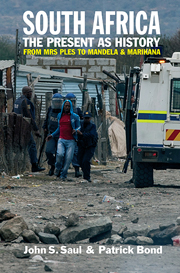Book contents
- Frontmatter
- Dedication
- Contents
- Introduction: South Africa in History
- Part I What's Past is Prologue: From the Beginnings to 1994
- Part II The Present as History: Post-Apartheid and Post-1994
- Part III Conclusions: The Future as History
- 6 Uneven and Combined Resistance: Marikana and The Trail to ‘Tunisia Day’ 2020
- 7 Liberating Liberation: The Struggle against Recolonization in South Africa
- Bibliography
- Index
7 - Liberating Liberation: The Struggle against Recolonization in South Africa
from Part III - Conclusions: The Future as History
Published online by Cambridge University Press: 05 December 2015
- Frontmatter
- Dedication
- Contents
- Introduction: South Africa in History
- Part I What's Past is Prologue: From the Beginnings to 1994
- Part II The Present as History: Post-Apartheid and Post-1994
- Part III Conclusions: The Future as History
- 6 Uneven and Combined Resistance: Marikana and The Trail to ‘Tunisia Day’ 2020
- 7 Liberating Liberation: The Struggle against Recolonization in South Africa
- Bibliography
- Index
Summary
Does it sit easily with the millions of ANC supporters here at home, and in the world at large, that during [the organization's] centennial year, the government, led by the ANC, presided over the first post-democracy state massacre … [For] Marikana is symptomatic of a much deeper malaise … Over the past eight years we have seen the escalation of local protests over perceived delivery failures and corruption at local government levels. It might well be that many of these protests were fuelled by rising expectations: [Certainly] there can be no doubt that in many instances this has led to ANC councilors losing legitimacy among the people. It is only a matter of time before that loss of legitimacy percolates upwards – to the provincial and national levels … [Indeed] the credibility of the ANC today is probably the lowest it has been since 1990!
Pallo Jordan, September 7, 2012From the vantage point of the troubled present, my conclusion highlights within South Africa's history both the rise of the ANC's mission of liberation and the disappointing and anti-climactic outcome that has followed from the ANC's ‘victory’. But it also seeks to register the complex cross-currents of the present moment and the still somewhat hesitant signs that some novel brand of post-ANC, counter-hegemonic, political expression may be beginning to emerge in South Africa – one that could in time displace the present ANC government itself and do so for the better.
- Type
- Chapter
- Information
- South Africa - The Present as HistoryFrom Mrs Ples to Mandela and Marikana, pp. 243 - 270Publisher: Boydell & BrewerPrint publication year: 2014



